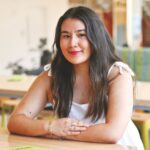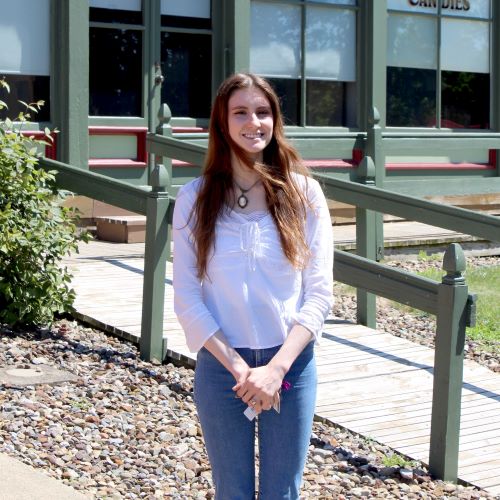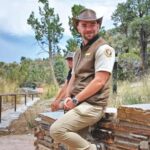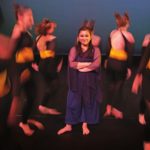
Digital history I.S. adds Indigenous voices to local history records

History has been a part of life for Glenna Van Dyke ’23 since being born into an Irish-American family in Pittsburgh. She took up Irish dance as a young child, and when she realized she was a little too awkward for dancing, she traded her dance shoes for a bagpipe. The bagpipe is how she discovered The College of Wooster as one of the few colleges and universities that offered Scottish arts scholarships.
Van Dyke chose Wooster, in part, because she could continue to play her beloved instrument, but the College’s emphasis on experiential learning and growth over competition ultimately won her over. She thrived in the environment and absorbed the lessons of her professors, especially in her history classes. Her long-time fascination with history expanded beyond the high school conversations about history in the public arena, such as Confederate monuments, sports teams’ names, and history curriculum, she said.
At Wooster, she became even more interested in the field when she saw people didn’t always have the same ideas about history. Though she didn’t know it at the time, her Independent Study topic was born. “I really wanted to learn more to see if I could use history to get the public to think about different people and groups in more complex ways,” Van Dyke said.
She found her niche in local history when she worked as a researcher with the Wooster Digital History Project during her freshman and sophomore years, completed an APEX internship at the Wayne County Historical Society in summer 2022, and served on the historical society board of trustees from June 2022 to April 2023.
She learned a lot about digital history with the Wooster project, while the internship focused on practical skills that would be helpful in a small museum job. “That definitely opened the door for me to be interested in local history,” she said, adding that internships, jobs, and volunteer opportunities are often able to inform ideas for I.S. topics.
Wayne County, she discovered, was a treasure trove of local history that gave her “a practical starting point for my I.S.,” she said. One book in particular, History of Wayne County from the Days of the Pioneers and First Settlers to the Present Time written in 1878 by Benjamin Douglass, shed light on how local history is generated, often without all of the voices represented.
Van Dyke’s I.S., “On This Land: Digital Indigenous History in Wayne County, Ohio,” is a website devoted to including the lost voices of the Indigenous communities, primarily those of the Delaware, Wyandot, and Shawnee. She credited Jordan Biro Walters, associate professor of history, whose work in Indigenous history informed and inspired Van Dyke to delve deeper into the topic. Her junior I.S. mentor Beatrice Adams, assistant professor of history, helped Van Dyke find and use her own voice, and senior I.S. mentor Katie Holt, associate professor of history, helped her to think carefully about the decisions she was making regarding the digital project.
“It’s wild to see your project take off and be read, not just by a faculty member, but by people in the community.”
—Glenna Van Dyke ’23, History and education (Social Studies) major
During Van Dyke’s I.S. literature research, she saw the gross over-simplification and misleading language describing the Native American peoples who inhabited the land before the white settlers and “pioneers” arrived. “Some of the language was just really hard to ignore in these texts. I also saw how little the text from the 1800s had been changed or modified in modern historical accounts,” she said. There were also several myths that Douglass perpetuated in his book.
The depth and breadth of Wayne County’s local history resources and Van Dyke’s collaboration with historians from the Delaware Nation, Wyandot Nation and the Delaware Tribe of Indians substantiated her hypothesis that the historical text minimized the contributions and lives of the Native American people in Wayne County.
From the beginning, she knew the web could be a powerful tool to communicate the scope of her research and reach a lot of people beyond the College community. She had witnessed the impact of the Wooster Digital History Project. Van Dyke’s website, which includes many helpful links and resources, dispels the myths found in Douglass’ book and “unpacks Wayne County, Ohio’s Indigenous history, how it has been portrayed for the last 150 years approximately, and how this came about in the Wayne County area.”
She presented the digital project during a Wayne County Historical Society board meeting earlier in the year where the project was well-received. Some members planned to share it with local school principals. “It’s wild to see your project take off and be read, not just by a faculty member, but by people in the community,” Van Dyke said. She hopes the project is viewed as a model for other counties who might also have local histories similar to Benjamin Douglass.
“I have really felt supported in creating this project, especially by the history department, especially for teaching me the emphasis on primary source research and historical writing,” she said. She will take a ninth semester to finish her education degree at Wooster, and then plans to pursue a master’s degree in public history, always with an eye toward local history.
Posted in Independent Study on May 10, 2023.
Related Posts
Related Areas of Study
History
Critically examine events and societies of the past and learn to tell the stories future generations need to know
Major MinorEducation
Graduate as a licensed teacher in pre-K-12 in fields ranging from science to music education
Major Minor Teaching Licensure

